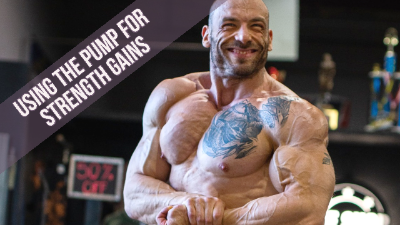
If you’re a strength athlete, you’ve probably been told at some point or another that “the pump doesn’t matter” when it comes to get stronger. On the surface, that makes sense: if you’re training for strength, you’re probably doing the majority of your work in the 1-5 rep range, and, generally, those rep ranges aren’t high enough to really get a good pump going.
But the pump can be an integral part of your training – and, more importantly, it should be. Here’s why:
The long and short of it is this: training for hypertrophy and training for strength go hand-in-hand. If you’re only focusing on one or the other, you’re selling yourself short. John Meadows and I actually discussed this point recently: back in the ’60s, ‘70s, and ‘80s, many powerlifters trained like bodybuilders for the majority of the year. It was only close to a competition that they would really cut back on the volume and start ramping up to near-max weights.
In my opinion, the pump is important for strength training for three reasons:
- The pump helps to build a better mind-muscle connection – and a better mind-muscle connection allows you to use better technique, even on competition lifts. Dave Tate recently shared the benefits of his own experience in bodybuilding, explaining that when he learned to control individual muscles, he was better able to recruit all the muscle groups involved in the squat, bench, and deadlift. I found that to be true for myself, as well.
View this post on InstagramOn the other hand, if you have a weak mind-muscle connection, you’re more likely to rely only on your strongest muscle groups. Over time, this inevitably leads to stalled progress and even injury.
- The pump helps build muscle. A great pump helps deliver blood (and therefore nutrients) to the muscles you're training, and there’s a lot of anecdotal evidence that suggests this increased blood flow increases protein synthesis. In other words: a better pump means more muscle, and, of course, more muscle means more strength.
- The pump is a great measure of fatigue. This is one that I’ll expand on in a later article, but in my experience, when I’m no longer able to sustain a pump, it’s time to call it quits for the day. Therefore, the pump can be a form of autoregulation you can employ to avoid overreaching on days when you aren’t feeling so hot, which is a very important skill to have when you’re training for strength.
Admittedly, if you’re like me and enjoy training with low reps all the time, getting a pump can be pretty difficult. But it’s not impossible! This is where your pre-workout nutrition comes into play. If you make sure to get a good, balanced meal in about 1 ½ - 2 hours before you train, and supplement with a scoop of Granite Pre-Mium about half an hour before you hit the gym, you’ll be primed to get a great pump. The food will make sure that you have the nutrients necessary for the pump. Pre-Mium includes a hefty 6-gram dose of L-Citrulline, which helps open up blood vessels to allow for a better pump and improve performance! Want more training advice? Be sure to follow the Granite Team on Instagram!









